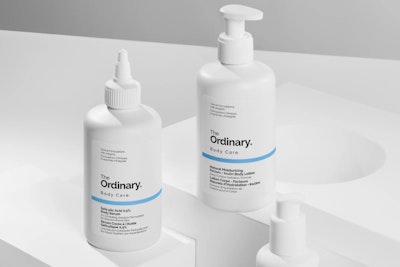The Ordinary
Minimal, science-driven skincare

The Ordinary's Sustainability Rating
Acceptable
Ingredients
The Ordinary doesn't make any ingredient commitments at the brand-level. Its parent company, Estee Lauder Companies, only makes commitments around sourcing RSPO-certified palm oil. Choice of ingredients is a strong determinant of environmental impact, and The Ordinary still uses many ingredients that pose a significant threat to the climate, including reef-harming sun care ingredients, and many petrochemical-based ingredients. It carries products that have certifications from Leaping Bunny, and PETA Animal Test-free.
Containers & Packaging
The Ordinary hasn't made any efforts to concentrate its products or minimize its containers, which increases shipping emissions and packaging volumes. It still relies on plastic packaging, of an unknown recycled content, but also uses some eco-friendly materials in its product containers, including ones that are recycled or FSC-certified.
Energy & Water Use
The Ordinary's parent company, Estee Lauder Companies, shares information on its overall energy strategy. It uses 100% renewable energy to power its direct operations, though it's unclear what proportion of its production this covers, and it doesn't share concrete targets for expanding its use of renewable energy. Estee Lauder Companies also implements energy efficiency measures in its direct operations. The Ordinary doesn't address renewable energy use or energy efficiency in its stores. It doesn't provide information on any water conservation strategies specific to its production. The Ordinary has a global production span, which is standard for the industry.
Refill & Reuse
The Ordinary offers a recycling program and recycling guidelines to help avert waste. Its recycling program is only available in its stores (and excludes California and South Korea), but it allows customers to drop off containers from any brand. It offers bulk sizes for some products, which may help reduce packaging waste.
Slow Cleaning
The Ordinary offers frequent releases, which can encourage overconsumption and production of excess inventory.
Marketing
Commons is still evaluating this brand's marketing emails.
Transparency & Reporting
The Ordinary has a series of sustainability pages with high-level details on its climate strategy, but these pages are hard to find on its website. Its parent company, Estee Lauder Companies, publishes a detailed annual report with a clear, impact-driven strategy and progress reporting. Its last annual report was published in 2023. The Ordinary shares a complete list of ingredients used in its products, on a per product basis.
Emissions Tracking
The Ordinary's parent company, Estee Lauder Companies, internally measures and publicly reports its company-level emissions in partnership with, or with auditing from, a third party. It includes a breakdown by scope and identifies its top driver of emissions. The last reporting period was 2023. In its most recent update, its estimated emissions footprint was 2,062,976 tons CO2e.
Targets & Offsets
The Ordinary's parent company, Estee Lauder Companies, has SBTi-approved emissions reduction targets for the medium-term (5-10 years). It has reported on its progress within the past year, and is on track for some of its targets. The Ordinary offsets emissions from its ecommerce shipping and shares details on the project it supports. Its parent company commits to offsetting its direct operations, but it's unclear if this extends to this brand.
Supply Chain & Labor
The Ordinary's parent company, Estee Lauder Companies, doesn't publish information about its supply chain partners It traces some of its overall ingredients supply chain, specific to 'sensitive' ingredients such as palm oil. It publicly shares a supplier code of conduct, which prohibits forced labor, prohibits child labor, and includes light environmental clauses. Its code of conduct doesn't disallow unauthorized subcontracting, ensure the right to collective bargaining where not allowed by law, ensure a living wage, or establish grievance mechanisms. Estee Lauder Companies has a stated policy of regularly auditing its supply chain partners, which can mitigate human and environmental risks.
Advocacy
The Ordinary's parent company, Estee Lauder Companies, discloses all of its trade association memberships, including those that are climate-obstructive. It's a member of 2 large climate-obstructive trade associations: U.S. Chamber of Commerce, Personal Care Products Council. It isn't a member of advocacy organizations advancing climate policy. Estee Lauder Companies employs state lobbyists with few fossil fuel aligned clients. It didn't donate more than $100k to climate-obstructive candidates or PACs from 2018-2024.
The Ordinary is rated Acceptable because it has started to improve its sustainability, but still has work to do on ingredients and packaging, which make up a large portion of the industry's impact.
The Ordinary is making efforts to reduce its packaging plastic use and waste, including by offering an in-store recycling program for any brand's product containers. However, it still appears to rely heavily on virgin plastic for its own containers. The Ordinary doesn't make any brand-level commitments related to its ingredients. Choice of ingredients is a strong determinant of environmental impact, and it uses many ingredients that pose a significant threat to the climate, including reef-harming suncare ingredients, and many petrochemical-based ingredients.
Its parent company reports on its majority-renewable energy strategy, emissions measurement, and SBTi-approved reduction targets.
The Ordinary is owned by DECIEM, a subsidiary of Estee Lauder Companies.
Our ratings are based on a scale from 1 (bad) to 5 (best). How we rate →
https://theordinary.com/en-us/everything-is-chemicals.html
https://media.elcompanies.com/files/e/estee-lauder-companies/universal/our-impact/si-s24/cdp-2024.pdf?_ga=2.45717220.1713907674.1742628992-1081797965.1742628992
https://theordinary.com/en-us/faq.html
https://theordinary.com/en-us/faq.html#products_regimens
https://media.elcompanies.com/files/e/estee-lauder-companies/universal/our-impact/si-s24/sis-2024.pdf?_ga=2.10132213.1713907674.1742628992-1081797965.1742628992
https://theordinary.com/en-us/disposal-instructions.html
https://theordinary.com/en-us/deciem-earth-climate.html
https://theordinary.com/en-us/deciem-earth-water.html
https://theordinary.com/en-us/deciem-earth-packaging.html
https://theordinary.com/en-us/deciem-earth.html
https://www.elcompanies.com/en/our-impact/social-impact-and-sustainability-report
https://sciencebasedtargets.org/target-dashboard
https://media.elcompanies.com/files/e/estee-lauder-companies/universal/our-commitments/supplier-code-of-conduct/elc_supplier%20code%20of%20conduct.pdf
https://www.elcompanies.com/en/our-impact/viewpoints/political-engagement
https://fminus.org/lobbyists/
https://www.fec.gov/data/browse-data/
Get Rewards
Earn for sustainable purchases
Commons rewards you for sustainable purchases from all our Top Rated brands, plus thousands of everyday purchases — from thrift stores to public transit.
Learn more about rewards ->







